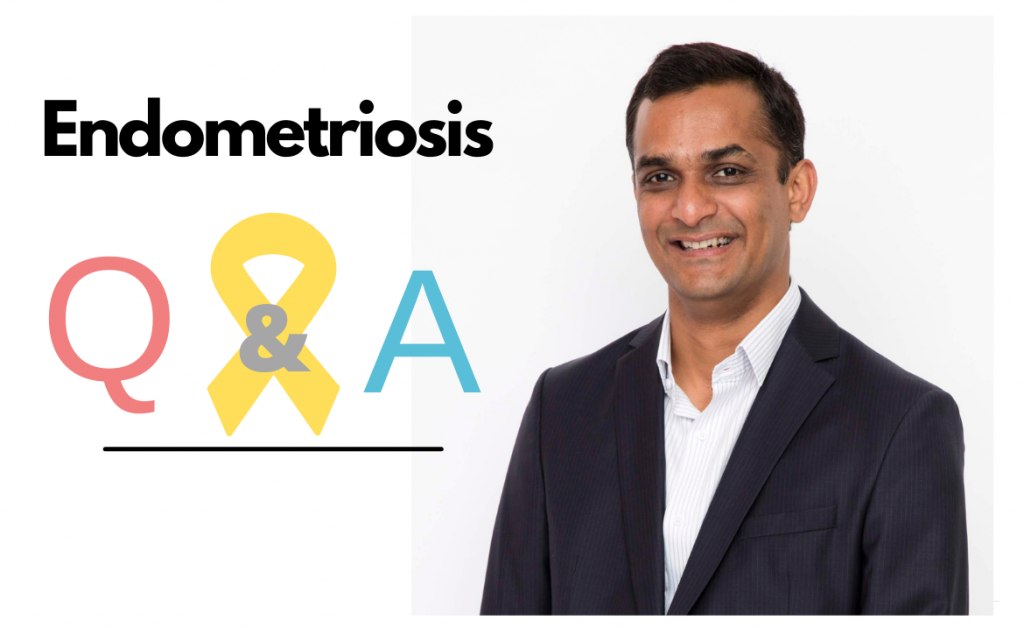March as we know it is also known as EndoMarch. A month in which we raise awareness about Endometriosis – a common women’s health concern diagnosed during their reproductive years, with 1 in 10 women suffering from it.
Endometriosis is a condition in which endometrial tissue that lines the uterus, grows outside the uterus, and eventually sheds into the abdominal cavity causing chronic pain, abnormal periods and/or infertility.
Below, Dr Kothari answers some of the most common questions he gets asked about Endometriosis and provides some key facts he wants every woman to know.
Q. How do I know if I have endometriosis?
All women are unique; therefore, the range and severity of symptoms will vary from person to person. In saying that, the most common symptom women suffer from is chronic pain which usually occurs during a woman’s period. Along with Chronic pain, other symptoms to look out for include:
- Fatigue
- Pain during or around ovulation
- Pain during or after sex
- Pain with bowel movements
- Pain when urinating
- Pain in your pelvic region, lower back, or legs
- Having trouble controlling a full bladder
- Heavy or irregular bleeding
Q. How can I distinguish between normal cramps and endometriosis?
Most women will experience some cramping during their menstrual cycle, which can be treated with localised heating pads and over-the-counter medication. However, it is not normal to experience severe pain at the onset of your period which may unable you to go to work or school and does not respond to over-the-counter medication. If you suffer from such chronic pain it is advised that you seek urgent medical advice to minimise further complications.
Q. What causes Endometriosis?
Whilst the exact cause is unknown, there are several theories regarding the cause, none of which are scientifically proven.
One theory suggests that it occurs due to a process called retrograde menstruation, in which the blood flows backwards through your fallopian tubes into your pelvic cavity instead of leaving your body through the vagina. Another theory is that hormones transform the cells outside the uterus into cells like those lining the inside of the uterus, known as endometrial cells.
Q. How is this condition diagnosed?
The best form of diagnosis is to perform a laparoscopy on the patient under general anaesthetic, during which a small incision is made on the skin and a tiny camera is inserted.
Q. Is Endometriosis curable and how is it treated?
Unfortunately, there is currently no cure for endometriosis, however, it can be treated in several ways, depending on the severity of the condition. Three was in which endometriosis may be treated include:
- Medical treatments: Includes hormonal and non-hormonal medication to manage pain and reduce oestrogen levels. Being the least invasive form of treatment, it is only suitable if you are currently not trying to fall pregnant.
- Surgical treatments: Involves laparoscopic surgery to remove endometrial tissue. As a highly experienced robotics surgeon I also use Robotics surgery in the treatment of Endometriosis. You can learn more about Robotics surgery for Endometriosis on the Davinci Robotics website.
- Allied treatments: You may opt for alternative medications and treatments such as physiotherapy and psychology as a form of supportive treatment.
- Assisted Reproductive Technology (ART): If you desire to start a family, this may be of consideration if surgical treatment has not helped. Commonly, ovulation-stimulating medication combined with Intra-Uterine Insemination (IUI) is all that is needed to further enhance fertility. In Vitro Fertilisation (IVF) may be recommended when the fallopian tubes have been irreversibly damaged, and if surgery and IUI have not helped achieve a pregnancy.
What to do next
If you or someone you know is suffering from chronic pain and discomfort during the onset of menstruation, contact our team on 02 4225 1999 to book an appointment.
Before moving ahead with treatment, Dr Kothari will discuss all the options available to you to suit your circumstances. He will thoroughly advise you on the side effects and advantages and disadvantages of each type of treatment. Whatever your decision, Dr Kothari and his team will support you every step of the way.

